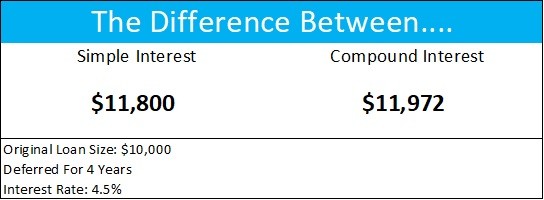Many believe that student loans are expensive because of compounding interest. However, many assume this but don’t actually ask the question are student loans simple or compound interest?
Thankfully, student loans are simple interest. If they weren’t, they’d cost even more than they already do.
In this article, I’ll deep dive into what you need to know about how interest is calculated for student loans.
Specifically, I’ll discuss how student loan interest works while you are in school, during your grace period, and after repayment begins
How Do Student Loans Accrue Interest?
Every day you are charged interest on your loans. If you do not pay this interest then it gets added to your loans.
Therefore, your how much you owe goes up. This happens while you are in school, during your grace period, and for some repayment options.
As stated above, interest does not compound on top of interest. I provide a detailed calculation of this below.
Student Loan Simple Interest Calculation During School
During school, there are two basic types of loans and each accrue interest differently.
Subsidized Loans
These are the easiest. While you are in school, subsidized loans do not accrue any interest. Therefore, you don’t have to worry about simple interest or compounding.
Unsubsidized Loans
These are the loans that can end up costing way more than you thought when you first took out your loans. I will illustrate how interest is charged on these loans with an example.
Let’s say you borrowed $5,000 at a 4% rate. The 4% is charged every day. That means you accrue $0.55 every day.
This equals approximately $16.44 a month or $197.26 a year. Therefore, a year after you borrowed the money, you’d owe $5,197.26.
Student loans are simple interest because interest is only charged on the amount that you borrowed, i.e. it is charged on the original $5,000 you borrowed.
If student loans were compounding interest, then the interest would be charged on the full amount you owe.
For example, after day one you owe $5,000.55. ($5,000 you borrowed plus $.55 in interest).
If loans compounded then you’d be charged on the full $5,000.55 the next day. Instead student loans are simple interest so you are still only charged interest on the original $5,000.
Student Loan Interest During Your Grace Period
You are not required to make a payment during your grace period. Therefore, interest is charged the same way as when you were in school.
Since you are being charged interest during this time period, it is imperative that you decide if you are going to pay off your loans or go onto an income-driven repayment plan. I.e. don’t wait until the end of your grace period if you do not have to.
As soon as you start working you want to choose one of those two strategies because starting your repayment plan will save you a lot of money in the long run.
Student Loan Simple Interest Calculation After School
After you graduate, your loans will capitalize.
To explain this, we’ll return back to our example from above.
After year one you owed $5,000 in original loan amount and $197.26 in accrued interest.
Let’s assume that you graduated and entered repayment at that one year mark. The interest is capitalized and now considered loan balance.
In simple words, the Federal government doesn’t assume you borrowed $5,000. They say you borrowed $5,197.26. Therefore, you are charged interest every day based on $5,197.26 not the original $5,000.
However, in between making payments, interest is still simple interest not compounding.
For example, Let’s say there are 30 days between my payments. The interest that I owe is based on $5,197.26. It doesn’t continue to add up and be charged more and more interest every day.

Student Loan Interest During Repayment
Knowing the difference between pay off and income-driven repayment strategies is extremely important.
If you are paying off your loans, then you pay off the interest you owe each month and the balance of what you owe decreases.
Income driven repayment plans such as IBR and PAYE do not work that way.
Most of the time on these plans, your payment isn’t enough to cover your interest charge each month. Therefore, the interest is added to what you owe and your loan balance goes up.
Again, the interest is computed via the simple interest method and is not compounded.
FAQ
Are student loans simple or compound interest?
No, simple interest is charged daily for student loans.
How often is student loan interest compounded?
Student loan interest isn’t compounded. It is charged daily.
Do Student Loans Continue To Accrue Interest?
Yes, most student loans accrue interest on a daily basis. The primary exception to this is subsidized loans. Also, there may be time periods whereby the government suspends this interest accrual such as during COVID and the subsequent CARES Act.
Conclusion
Most people don’t ask if student loans are simple or compound interest. They just assume they compound because that is what they heard someone say on the internet.
Thankfully, they are not compound interest. They are simple interest.
I say thankfully because if they were compound interest, they would cost even more than they do now.
If you need help deciding if you should pay the interest first or just setting up a financial plan in general, be sure to check out our new financial planning technology for young professionals.
We’ll make sure you are doing the right thing with your loans as well as other items such as home buying and investments.
